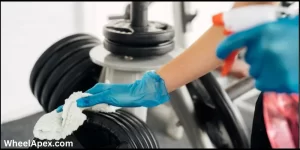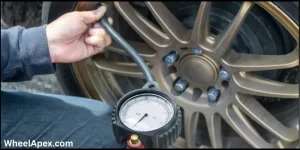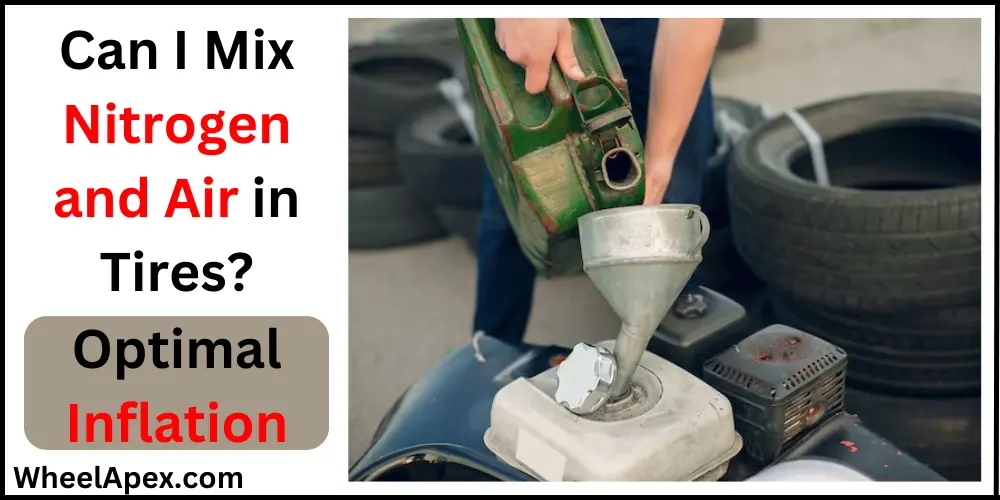In the realm of tire maintenance, the debate over using nitrogen or regular air for tire inflation has been a topic of discussion. Among motorists and industry professionals alike. Nitrogen has gained popularity for its purported benefits. Such as maintaining tire pressure for a more extended period and reducing the risk of tire failures. A common question arises: Can I Mix Nitrogen and Air in Tires? Let’s delve into the science behind tire inflation to find the answer.
Contents
- 1 Can I Mix Nitrogen and Air in Tires?
- 1.1 Understanding Nitrogen in Tires
- 1.2 Benefits of Nitrogen
- 1.3 Mixing Nitrogen and Air
- 1.4 Factors to Consider
- 1.5 Is Nitrogen Good for Tires in Summer?
- 1.6 How Much Nitrogen Should I Put in My Tires?
- 1.7 Can We Fill Nitrogen in Tubeless Tires?
- 1.8 Does Nitrogen Increase Tire Life?
- 1.9 Does Nitrogen Affect Tire Pressure Sensors?
Can I Mix Nitrogen and Air in Tires?
Can I mix nitrogen and air in tires? In most cases, it is safe to mix nitrogen and air in tires. The gases are compatible. Mixing them will not result in any immediate dangers or adverse reactions. Need to to understand that the benefits of using nitrogen might be compromised to some extent when mixed with regular air.
Understanding Nitrogen in Tires
Nitrogen, in comparison to regular air, is a dry and inert gas. It contains less moisture and other impurities that can lead to oxidation and corrosion within the tire. The absence of water vapor in nitrogen contributes to more stable tire pressure over time. Water vapor tends to expand and contract with temperature fluctuations.

Benefits of Nitrogen
Proponents of nitrogen inflation argue that it offers several benefits. Including enhanced tire life, improved fuel efficiency, and reduced oxidation within the tire. The stable nature of nitrogen leads to slower pressure loss. Meaning tires stay inflated for more extended periods, resulting in better fuel efficiency and safety.
Mixing Nitrogen and Air
The ideal scenario involves using pure nitrogen for tire inflation to maximize its benefits. Can I mix nitrogen and air in tires? In practice, it is not uncommon for tires to be topped off with regular air. Many drivers wonder if there are adverse effects to mixing nitrogen and air in their tires.

Factors to Consider
- Pressure Stability: The primary advantage of nitrogen is its stability in maintaining tire pressure. While mixing nitrogen and air won’t cause harm. It may lead to faster pressure loss compared to using pure nitrogen.
- Moisture Content: Nitrogen’s superiority lies in its dry nature. Mixing it with regular air introduces moisture into the tire, contributing to corrosion over time.
- Performance Impact: While the impact of mixing is generally minimal, high-performance vehicles. Or those used in extreme conditions might experience compromised performance compared to using pure nitrogen.
Is Nitrogen Good for Tires in Summer?
Nitrogen is not helpful for tires in summer. While it may reduce pressure fluctuations due to its stable nature. The benefits are minimal for typical consumer use. Regular air remains a practical and cost-effective choice. Proper inflation and maintenance are crucial for optimal summer tire performance.
How Much Nitrogen Should I Put in My Tires?
Keeping up with the right tire pressure is significant for safety and effectiveness. Nitrogen offers stable inflation and reduces pressure loss over time. Optimal levels vary by vehicle. So consult your owner’s manual or the tire information placard on your car for the recommended pressure. Always check and adjust as needed.
Can We Fill Nitrogen in Tubeless Tires?
Filling tubeless tires with nitrogen offers benefits. Like slower pressure loss, reduced oxidation, and improved fuel efficiency. While air is used, nitrogen minimizes temperature-related pressure fluctuations. For everyday consumer use, the advantages may not justify the cost. Which makes nitrogen inflation more prevalent in specific applications like aviation and racing.
Does Nitrogen Increase Tire Life?
Nitrogen in tires extends tire life by reducing oxidation and pressure fluctuations. Unlike oxygen, nitrogen doesn’t degrade rubber and maintains stable tire pressure. While the impact on lifespan is modest. It can enhance safety and fuel efficiency by sustaining proper tire inflation. Especially in extreme temperature variations.
Does Nitrogen Affect Tire Pressure Sensors?
Nitrogen, used in tires, can affect tire pressure sensors. While nitrogen provides more stable pressure due to its lower permeability. It won’t impact sensor accuracy. It’s essential to ensure sensors are calibrated. As any gas changes can affect readings. Regular monitoring remains crucial for optimal performance.
Conclusion
The science supports the idea that mixing nitrogen and air in tires is generally safe. Can I mix nitrogen and air in tires? To capitalize on the benefits of nitrogen. It is advisable to maintain a higher percentage of nitrogen in the tire. Regular monitoring of tire pressure and occasional top-offs with pure nitrogen. It helps to ensure the desired outcomes. Motorists should weigh the trade-offs between the convenience of using available air. The potential long-term benefits of nitrogen when deciding on tire inflation strategies. A well-maintained tire, regardless of the gas used, contributes to vehicle safety, performance, and fuel efficiency.
Sources:
- By Martin Bayer What happens when you mix air and nitrogen in a tire? Posted 2 Years Ago.
- By JimJamSlamBam, Can I put regular air in my nitrogen filled tires? Posted 1 Jan 2023.

